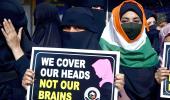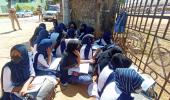The Supreme Court will hear on Friday a plea challenging a Bombay high court verdict upholding a Mumbai college's decision to ban hijabs, burqas and naqabs inside the campus.

A bench comprising Chief Justice D Y Chandrachud and Justices J B Pardiwala and Manoj Misra on Thursday took note of the submissions of a lawyer that term exams begin on Thursday and students from the minority community are bound to face difficulties due to instructions on the dress code.
Lawyer Abiha Zaidi, appearing for the petitioners, including Zainab Abdul Qayyum, had sought an urgent hearing on grounds of the unit tests beginning.
"It is coming up tomorrow (Friday). I have listed it already," the CJI said.
The high court on June 26 refused to interfere with the decision of the Chembur Trombay Education Society's N G Acharya and D K Marathe College imposing the ban, saying such rules do not violate the fundamental rights of students.
It said a dress code is meant to maintain discipline and this is part of the college's fundamental right to 'establish and administer an educational institution'.
The top court is yet to conclusively decide the legality of such diktats issued by educational institutions.
On October 13, 2022, a two-judge bench of the apex court delivered opposing verdicts in the hijab controversy emanating from Karnataka.
The then Bharatiya Janata Party-led state government had imposed a ban on wearing the Islamic head covering in schools there.
While Justice Hemant Gupta, since retired, dismissed the appeals challenging the judgement of the Karnataka high court refusing to lift the ban, Justice Sudhanshu Dhulia held there shall be no restriction on the wearing of hijab anywhere in schools and colleges of the state.
The top court is yet to constitute a larger bench to decide the Karnataka hijab row.
The Mumbai college's decision has again put the spotlight on the issue.
The Bombay high court had trashed the plea against the ban, saying the dress code was applicable to all students irrespective of religion or caste.
The students, who were in the second and third year of the science degree course, had moved the high court, challenging a directive issued by the college imposing a dress code under which students cannot wear hijabs, naqabs, burqas, stoles, caps and badges on the premises.
The students claimed it was against their fundamental right to practice religion, the right to privacy and right to choice. The college's action was 'arbitrary, unreasonable, bad-in-law and perverse', the plea argued.
The high court, however, said it could not see how the prescription of dress code by the college violated Articles 19(1)(a) (freedom of speech and expression) and 25 (freedom to practice religion) of the Constitution.
The high court had also refused to accept the petitioners' contention that wearing a hijab, naqab and burqa was an essential practice of their religion.
"Except for stating that the same constitutes an essential religious practice on the basis of the English translation of Kanz-ul-Iman and Suman Abu Dawud, there is no material placed to uphold the petitioners' contention that donning of hijab and naqab is an essential religious practice. The contention in that regard, therefore, fails," the HC had said.
The dress code was mandatory only within the college premises and the petitioners' freedom of choice and expression was not otherwise affected, it had said.










